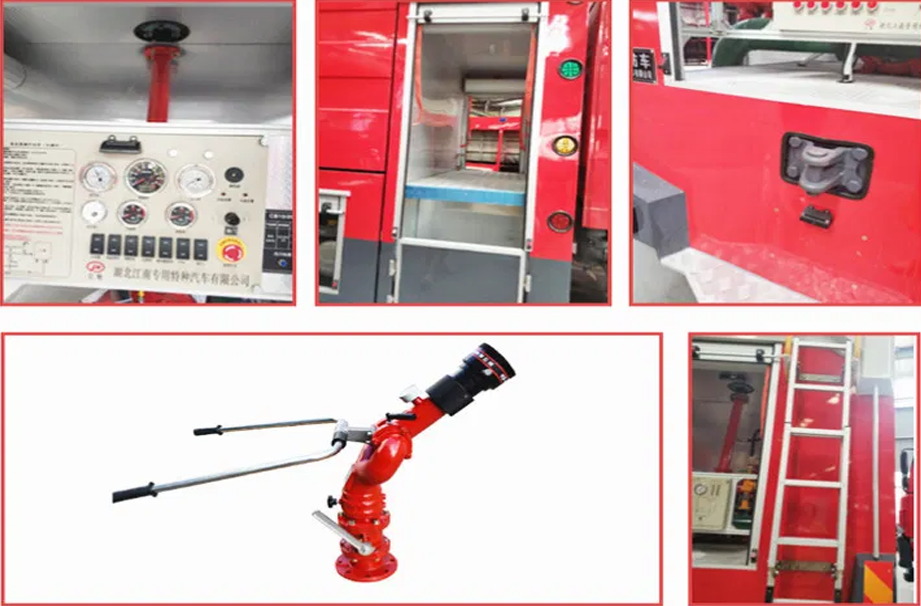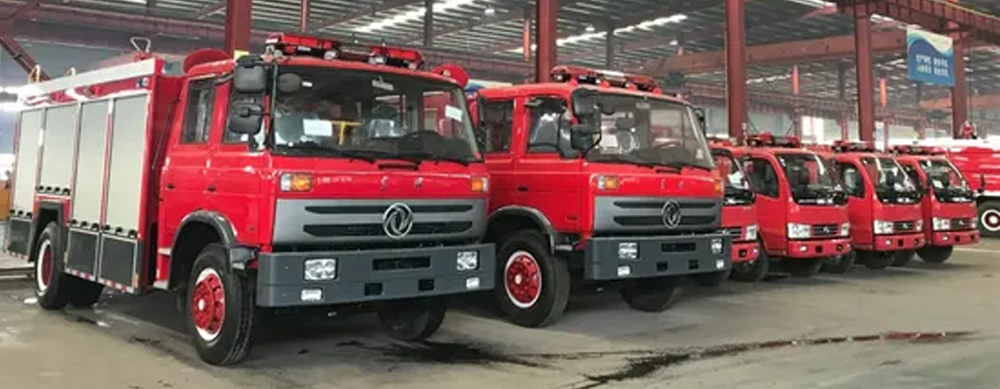A fire fighting truck is a crucial and specialized vehicle that serves as the frontline defense against blazes. Built with a rugged, heavy-duty chassis, typically made of high-strength steel, it can withstand the rigors of rapid deployment and rough terrains.
The truck is equipped with a large-capacity water tank, often holding thousands of liters, along with powerful pumps that can shoot water or fire retardant agents with great force and distance. It also features an array of hoses, ladders, and nozzles, which are essential for reaching different heights and accessing hard-to-reach fire spots.
The cab is designed for the comfort and efficiency of firefighters. It has ergonomic seats and intuitive controls, allowing for swift driving to emergency sites. Additionally, bright flashing lights, sirens, and reflective markings adorn the truck, ensuring high visibility during its hurried journey, so it can promptly arrive and combat fires, safeguarding lives and property.
| The specification of 10CBM ISUZU Foam Water Fire Fighting Truck | ||
| Description | DONGFENG 1208 Water Foam Fire Truck | |
| Drive Model | 6X4 | |
| Chassis | EQ1208 | |
| Vehicle Main Dimensions | Dimensions(L x W x H)mm | 9550×2500×3400 |
| Wheel base (mm) | 4325+1350 | |
| Overhang (front/rear) (mm) | 1245/2565 | |
| Wheel track (front/rear) (mm) | 1940/1860 | |
| Approach/Departure angle(°) | 27/12 | |
| Weight in KGS | Curb Weight | 11650 |
| GVW. | 21700 | |
| Max. driving speed(km/h) | 90 | |
| Passenger | 2+3 | |
| Engine | Model | B210 33 |
| Type | 4-stroke direct injection, 6-cylinder in-line with water cooling, turbo-charging and inter-cooling | |
| Horse Power(HP) | 210 | |
| Emission standard | Euro III | |
| Gearbox | 8 forwards & 1 reverse | |
| Clutch | Reinforced diaphragm clutch | |
| Steering Gear | Power steering, hydraulic steering with power assistance | |
| Fuel tank (L) | 200 | |
| Tire | 10.00R20tire ,6+1 spare | |
| Brakes | dual circuit compressed air brake | |
| Cab | four doors, double row | |
| Water volume(L) | 10000 | |
| Foam volume(L) | 3000 | |
| Equipment | Fire pump:model:CB10/60 flow:60L/s Pressure: 1.0MPa Suction Time:≤35s Mounted type: rear position Fire gun:model: PS50 flow:50L/s Pressure: 1.0MPa Shooting range(water,foam:)≥65m ,≥60m Rotation Angle(°):360/-30~80 Operating model: manual | |

1. The chassis of a fire fighting truck is its fundamental structural base, usually constructed from thick, high-strength steel plates. It must be extremely robust to support the heavy weight of the water tank, fire-fighting equipment, and the crew.
2. A large-capacity water tank is a core component. These tanks can hold anywhere from a few thousand to tens of thousands of liters of water, depending on the truck's size and intended use. They are made of corrosion-resistant materials to maintain water quality over time.
3. Fire fighting trucks are equipped with multiple hose reels, strategically placed around the vehicle for easy access. The hoses, typically made of durable rubber or synthetic materials, come in various lengths and diameters.
4. Many fire fighting trucks feature extendable ladders or aerial platforms. Telescopic ladders can reach impressive heights, sometimes over 100 feet, enabling firefighters to access upper floors of burning buildings.
5. The cab is designed with the comfort and functionality of the firefighters in mind. It has ergonomic seats to reduce fatigue during long emergency response rides. The controls for driving the truck, such as the steering wheel, accelerator, brakes, and transmission, are laid out intuitively.
6. Fire fighting trucks are outfitted with an array of lights and warning devices. Bright, flashing lights, usually in red and blue, are mounted on the roof, front, and sides of the truck to attract immediate attention on the road.

1. Water Capacity: The amount of water a fire-fighting truck can carry is crucial. Consider the area you serve and the typical fire scenarios. In urban areas with access to hydrants, a truck with a smaller water tank (e.g., 3,000 - 5,000 liters) might be sufficient.
2. Pump Performance: The pump's power and flow rate are vital. The pump's horsepower determines the pressure it can generate.
3. Hoses and Nozzles: The length and diameter of hoses are important. Longer hoses (e.g., 30-100 meters) provide greater reach, which is useful for large-area fires or when the truck can't get close to the fire source.
4. Ladders and Aerial Platforms: If your area has a lot of high-rise buildings, a fire-fighting truck with a tall, extendable ladder (e.g., over 100 feet) or an aerial platform is essential.
5. Engine Power: The engine should have enough horsepower to carry the heavy load of the truck (including the water tank and equipment) and still be able to respond quickly to emergencies.
6. Transmission and Suspension: A smooth-operating transmission is important for quick gear-changing and efficient power delivery. The suspension system should provide a stable ride, even when the truck is carrying a full water tank and equipment.
7. Operator's Comfort: The cab should have an ergonomic seat to reduce operator fatigue during long-haul responses. Adequate legroom, headroom, and a comfortable driving position are important.
8. Crew Space and Accessibility: The crew compartment should have enough space for firefighters to don their gear and store essential equipment.

Firefighting trucks are equipped with high-performance pumps, often centrifugal in design. These pumps can generate remarkable pressure and flow rates, allowing water or fire retardant agents to be projected over long distances and to great heights.
A significant water tank is a hallmark of these trucks. Capacities typically range from several thousand to tens of thousands of liters, depending on the truck's intended use and the area it serves.
Multiple hoses of varying lengths and diameters are stowed on the truck. Longer hoses, sometimes stretching up to 100 meters or more, offer the reach necessary to access fires that are a considerable distance from the vehicle.
Many firefighting trucks feature extendable ladders or aerial platforms. Telescopic ladders can soar to heights exceeding 100 feet, granting firefighters access to upper floors of burning structures.
The chassis is a heavy-duty, high-strength steel structure built to bear the weight of the water tank, firefighting equipment, and the crew.
Firefighting trucks are decked out with a host of safety and visibility features. Bright, flashing lights, usually in red and blue, are mounted on the roof, front, and sides to command immediate attention on the road.
The cab is designed with the comfort of the driver and crew in mind. It houses ergonomic seats to reduce fatigue during long emergency responses. The controls for driving the truck are laid out intuitively.

